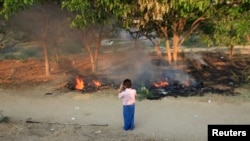Burma's government has declared a state of emergency in a central region where three days of Buddhist-Muslim clashes have left at least 20 people dead.
Witnesses reported seeing charred bodies in the streets Friday and flames billowing from buildings, including mosques, in the town of Meiktila.
Win Htein, a member of parliament from Meiktila, told VOA he saw victims lying in the streets and rioters burning property and looting Muslim homes.
"When I was off from home this morning, there are three bodies on the street of Thiri Mingalar quarter, but I can’t estimate numbers of injured," he said. "I don’t think there are many injured, because [victims] were mostly killed out-right. Once they were caught, the victims were killed and burnt down."
Authorities fear the death toll from the ongoing unrest, which began Wednesday after an argument between a Buddhist customer and a Muslim gold proprietor, could grow. Officials have imposed a nighttime curfew, and many residents of Meiktila say they are afraid to leave their homes.
Scarce details
Details on the clashes have been scarce, since many reporters say they have been prevented from covering the conflict and threatened by Buddhist monks who are leading the mobs.
The United States and the United Nations have called for an end to the violence, Burma's worst sectarian unrest since last year's clashes between Buddhists and ethnic Rohingya Muslims in western Rakhine state.
Amnesty International called the latest violence "very worrying," saying it shows that tension between the two communities is spreading to other parts of the country.
Clashes last year in Rakhine State killed about 200 people and left more than 100,000 others homeless, mainly ethnic Rohingya Muslims.
During the Rakhine unrest, rights groups accused Burmese security forces of failing to protect Buddhists and Muslims. Human Rights Watch said security forces "unleashed a campaign of violence and mass roundups against the Rohingya."
Rights groups have since said anti-Muslim leaflets have been distributed at monasteries in some areas of the country, with many warning of more violence against Muslims.
Some information for this report was provided by AP, AFP and Reuters.
Witnesses reported seeing charred bodies in the streets Friday and flames billowing from buildings, including mosques, in the town of Meiktila.
Win Htein, a member of parliament from Meiktila, told VOA he saw victims lying in the streets and rioters burning property and looting Muslim homes.
"When I was off from home this morning, there are three bodies on the street of Thiri Mingalar quarter, but I can’t estimate numbers of injured," he said. "I don’t think there are many injured, because [victims] were mostly killed out-right. Once they were caught, the victims were killed and burnt down."
Authorities fear the death toll from the ongoing unrest, which began Wednesday after an argument between a Buddhist customer and a Muslim gold proprietor, could grow. Officials have imposed a nighttime curfew, and many residents of Meiktila say they are afraid to leave their homes.
Scarce details
Details on the clashes have been scarce, since many reporters say they have been prevented from covering the conflict and threatened by Buddhist monks who are leading the mobs.
The United States and the United Nations have called for an end to the violence, Burma's worst sectarian unrest since last year's clashes between Buddhists and ethnic Rohingya Muslims in western Rakhine state.
Amnesty International called the latest violence "very worrying," saying it shows that tension between the two communities is spreading to other parts of the country.
Clashes last year in Rakhine State killed about 200 people and left more than 100,000 others homeless, mainly ethnic Rohingya Muslims.
During the Rakhine unrest, rights groups accused Burmese security forces of failing to protect Buddhists and Muslims. Human Rights Watch said security forces "unleashed a campaign of violence and mass roundups against the Rohingya."
Rights groups have since said anti-Muslim leaflets have been distributed at monasteries in some areas of the country, with many warning of more violence against Muslims.
Some information for this report was provided by AP, AFP and Reuters.









